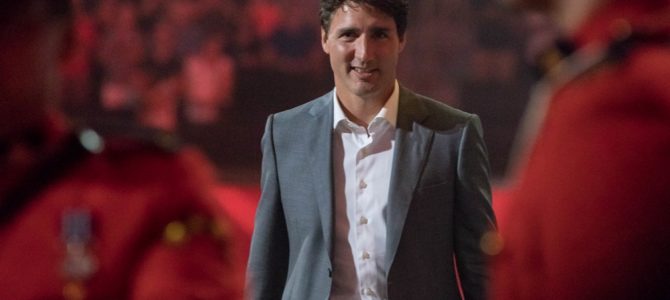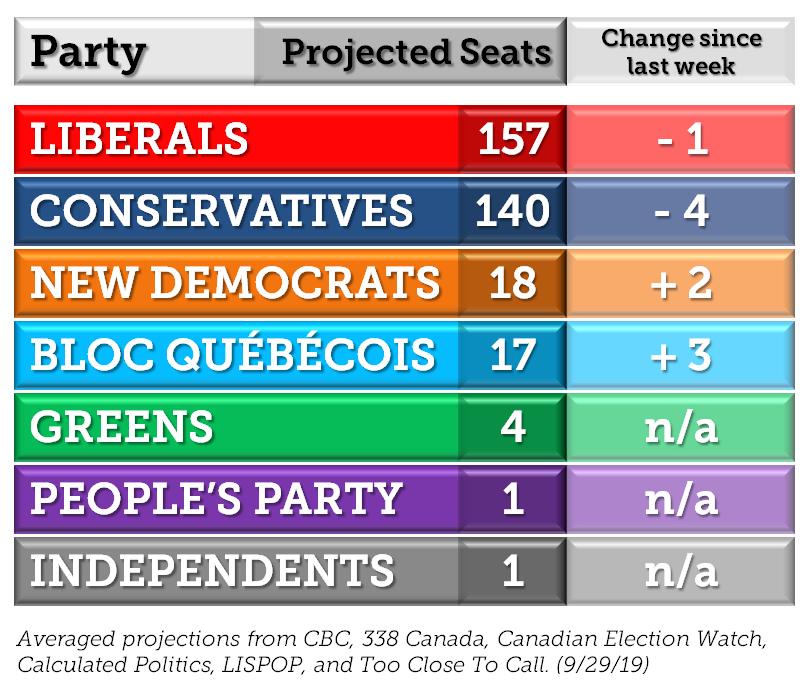
There are just three weeks left before Canadians will vote in the 2019 federal election. The blackface scandal that rocked the start of the campaign and threatens to undo Prime Minister Justin Trudeau’s image has been fully factored into the polls.
We’ll know soon if enough if Trudeau’s Liberal Party of Canada holds onto or even expands on their seats in parliament. During the last week, there have been some notable shifts in projections and voter sentiment. Here’s where the race stands now.
Conservatives Say Trudeau Has Damaged Canada’s Image
Since the initial revelations, Trudeau was questioned multiple times about the exact nature of his most offensive blackface costume, but stuck to a campaign talking-point that he will “continue to be open with Canadians.” The scandal was also the focus of the PM’s first interview since the scandal broke, in which Trudeau continued to dodge questions about the possibility of future revelations and more “skeletons” in Trudeau’s closet coming back to haunt him.
The blackface video from the 1990s may prove to be the most harmful to Trudeau’s image as new high-quality footage of the incident has now been uncovered. The new clearer video brought the scandal back into the campaign and earned Trudeau fresh condemnation from former allies on the left such as Piers Morgan.
The Conservative Party of Canada has incorporated Trudeau’s blackface scandal alongside embarrassing commentary from across the world into a bold new ad blitz. Canadians have long guarded their image abroad, typically a source of pride. In another ad, Seth Meyers quips that “Canadians traveling in Europe are gonna start telling people they’re American.” The CPC ad is part of a narrative telling Canadians Trudeau is “not as advertised.”
Along with stressing the damage that Trudeau has done to Canada’s image around the world, CPC leader Andrew Scheer has promised that, if elected, his government will re-open the SNC-Laval scandal, in which Trudeau is accused of using government power to affect a criminal case. Scheer announced, “A Conservative government will launch a judicial inquiry into Justin Trudeau’s role in the SNC-Lavalin corruption scandal … [ensuring] no other corrupt politicians can stonewall police investigations, because no one is above the law.”
‘Green’ Issues Drawing More Attention
An interesting turn in the 2019 federal election campaign has been the increasing prominence of “the environment” as an issue. Trudeau sat down for a one-on-one meeting with climate activist Greta Thunberg. Trudeau promised to pay for the planting of 2 billion new trees in the next decade but was chided by Thunberg for “not doing enough” to stem what the 16-year-old sees as a coming “climate apocalypse.”
With the apparent rise of environmental concerns in the minds of Canadian voters, the Green Party of Canada has witnessed a bump in its numbers, seemingly at the expense of the Liberals. It remains to be seen whether the “Green surge” is a momentary aberration brought on by the press coverage given to the “Global Climate Strike,” or a permanent pivoting to the environment as a top election issue.
The Green Party will have to confront, however, the parliamentary budget experts who gave the Greens’ proposed budget a failing grade. Analysts have declared that the Green Party’s budget doesn’t add up and is in effect, unworkable.
Leader of the Far-Left NDP Attacks Trump
Raising quite a few eyebrows while campaigning in British Columbia, New Democratic Party leader Jagmeet Singh voiced to his supporters that he hoped President Donald Trump would be impeached. Singh added that it was “disgusting that the president could inflame hatred against people and be so divisive.” Of his impeachment hopes, he said his comments were “a little tongue-in-cheek.”
One day later, however, Singh doubled-down and repeated his comments, this time exclaiming that he wasn’t joking after all. As relayed by CBC, Singh told reporters “Canadians expect to have someone who’s going to stand up to Mr. Trump … Canadians don’t want someone … who is going to back down from a bully.”
The comments may have made for some easy applause among NDP faithful, but Singh’s remarks drew a fair amount of criticism from across the voter spectrum. Regardless of one’s opinion of Trump, it’s very ill-advised—and in poor taste—for the leader of Canada’s third-place political party to speak so disparagingly of the legally elected head of the nation’s largest trading partner and ally. If Singh manages to somehow pull off what would be an unbelievable electoral upset, he’s created quite an unenviable diplomatic starting position with the United States.
Trudeau’s Blackface Scandal May Still Hurt Liberal Odds
According to Frank Graves’ eagerly awaited polling results from his EKOS firm, the blackface escapade had a severe initial negative effect on voters. Twenty-eight percent of respondents said the incident was “serious.” Twenty-four percent indicated that it would affect how they vote. Of Liberal Party voters, only 6 percent consider the scandal serious, and 7 percent say it will affect their vote.
Polling from Abacus Data corroborates the findings from EKOS. While a full 76 percent said that it either “didn’t bother them” or “felt they could move on,” 24 percent said that they were “truly offended” and it “changed their view of Mr. Trudeau for the worse.” Abacus notes that of that last group, two-thirds were Conservative Party voters—leaving about 8 percent of voters, scattered across the various parties, whom the Liberals may be on the verge of losing. If that turns out to be true and if that holds until October 21, then the blackface scandal may well end up costing the Liberals crucial seats in tight races, and perhaps the election.
It appears on the whole, however, that blackface backlash has subsided. Graves notes that the quick turnaround indicates “large pockets of turbulence in the voter landscape.” This volatility combined with the number of close races across the country could make for quite an interesting election night. One region to keep an eye on will be the so-called “905” area of Ontario, outside the city of Toronto.
So-called ‘905’ Region May Decide the Election
While uncertainty clouds how well the Liberals can expect to perform in Quebec, the path to winning the election looks to come down, once again, to the seat-rich province of Ontario. Central to any party emerging victorious in Ontario lies in the 905 ridings which, in turn, means the 905 is the key to forming a government.
A closer look at polling from Nik Nanos shows that Trudeau’s Liberals are losing ground in the 905 region—named for the area code given to the regions of Halton, Peel, York, and Durham, the Niagara Peninsula, the city of Hamilton, and parts of Northumberland County. CTV went so far as to say the Liberals are getting “hammered” in Ontario’s 905 region.
Worth remembering is that when conservative Doug Ford become the premier of Ontario in last year’s provincial election, conservatives won 21 of 25 seats in the 905 belt. Ford’s popularity, however, has suffered a hit since his inauguration. Trudeau has taken to name-dropping Ford at every opportunity whenever he’s on the campaign trail in Ontario. Nevertheless, it would still be quite the turn of events if the area flipped back to the Liberal Party in a little more than a year.
One riding to keep an eye on is Northumberland—Peterborough South, which contains the delightful lakefront town of Port Hope (recently the stand-in for the fictional Derry, Maine in the latest “It” films). Although the riding was part of a redistricting in 2013, the Northumberland region of the 905 has long been a bellwether of national sentiment. The riding containing Northumberland has coincided with the party that wins the federal election for the last 26 years.
Due to how tight all of the riding-by-riding fights are in the 905, it’s improbable either the Liberals or Conservatives can afford to stumble there. A few percentage points in either direction could swing the entire contest and decide who becomes prime minister of Canada.
Latest Projections Still for Liberal Minority Government
For this update, I added in projections from LISPOP, who is providing projections out of Wilfrid Laurier University’s Laurier Institute for the Study of Public Opinion and Policy. This week’s average of seat projections from 338 Canada, Canadian Election Watch, Calculated Politics, Too Close To Call, LISPOP, and the CBC predicts a minority government for Trudeau’s Liberals.

Although I’m currently predicting the Liberal Party of Canada will come up short of the 170 seats to form a majority government, it’s very likely the NDP would agree to prop up Trudeau’s Liberals and allow them to govern.
Again, this result is by no means a sure thing. On October 2, the first major debate (taking place in Montreal, Quebec) may well shake up the standings. There remains a lot of movement and undecided voters among the Canadian electorate, and as noted, the 905 region will go a long way in deciding who leads Canada for the next four years.









